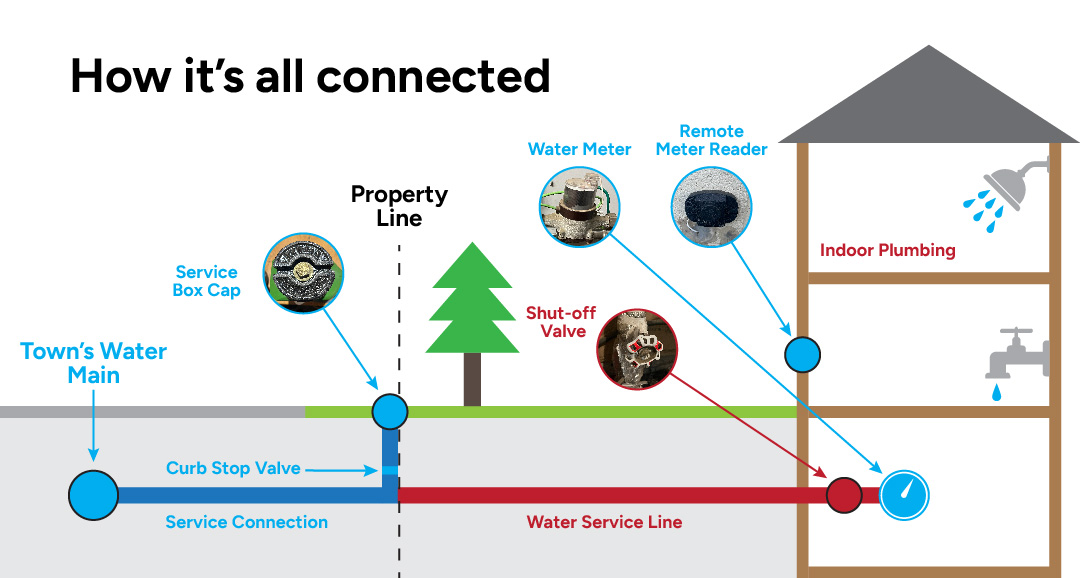You can apply for utilities (water and garbage):
-
By phone or in person at Town Office
- Submit a Utility Application form online
This website uses cookies to enhance usability and provide you with a more personal experience. By using this website, you agree to our use of cookies as explained in our Privacy Policy.
You can set up services within the Town for utilities including water and garbage. To set up power and electricity services to your home contact a private supplier. Please visit Utilities Consumer Advocate for a list of local providers.
Learn more about utility locates and water meters in Stony Plain.
The Town provides water, sewer and household waste (garbage, organics, and recycling) services.
You can apply for utilities (water and garbage):
By phone or in person at Town Office
You can cancel your utility account (water and garbage):
Stony Plain has moved to a variable rate for utilities. Your bill is based solely on consumption. It encourages the conservation of water and distributes the cost more equitably among residents.
The change to the method of billing for water and sewer does not raise any additional revenue for the Town.
Try our utility bill calculator to estimate your upcoming bill.
You can find the storm water fee on your utility bill. The monthly rates are as follows:
Before 2020, storm water maintenance and repair costs were included in your property taxes, based on the assessed value of your home. A portion was also collected through sanitary sewer rates.
After the flooding events of 2019, the decision was made to separate this fee out and charge a "per door" fee to fund needed improvements.
The storm water utility is a more transparent and fair way to fund the storm water system
You can pay for your utility bill:
In person at Town Office
Online: You can pay through online banking. Choose Stony Plain Utilities as the payee. Type your utility account number as the account number
With automatic payments: Fill out the automatic payment form. You will need a void cheque or banking information. You can drop off your completed form or email it to us
You must register to view your bill. To get your User ID, please contact Town of Stony Plain at (780) 963-2151.
Town vs Property Owner Responsibilities

| Town's Responsibility | Property Owner's Responsibility |
|
Service Box Cap: An iron disc, approximately 4 inches in diameter, located on the property line. The Town is responsible for normal wear and tear. |
Service Box Cap: An iron disc, approximately 4 inches in diameter, located on the property line. This must be kept to grade and protected from damage during landscaping, driveway restoration, etc. |
| Curb Stop Valve: Located underground, this valve controls the flow of water from the water main to your property. |
Water Service Line: Pipe that runs between the curb stop valve and your property. |
| Remote Meter Reading Device: A small box mounted on the exterior of your property that allows the Town to obtain meter readings without entering the premise. |
Indoor Water Shut-off Valve(s): Shuts off the water supply to your property. Must be installed and maintained before and after the water meter. |
| Water Mains: More than 104 kilometres of underground pipes throughout the Town that carry water to water service lines. |
Indoor Plumbing: The system of water pipes, drains, fittings, valves, and fixtures in your building that distribute water. |
| Service Connection: The part of the pipe that runs from the water main to the curb stop valve in front of your property. |
Wire to the Meter: A 22 gauge, 4 wire that relays a signal from the meter to the outside touchpad remote. |
| Water Meter: Records the volume of water used by your property. |
Property owners shall provide free, clear, and unobstructed access to the water meter at all times. Tampering or any alteration to the water meter is prohibited under the Town’s Utility Bylaw 2653/UTIL/21 |
10 tips to conserve water at home:

Frozen water pipes can be an inconvenience and may sometimes interrupt your water supply. The first step in resolving the issue is to locate the frozen section of the pipe. If the pipe is frozen on your property, it is your responsibility to address the repair.
We recommend contacting a licensed plumber to assess the situation and pinpoint the frozen area. If needed, you may also contact the Town of Stony Plain’s Water Department for additional guidance:
Prevent Frozen Pipes
During colder months, pipes in uninsulated areas are particularly vulnerable to freezing. Consider the following precautions to prevent pipes from freezing:
If you’re planning an extended absence, it’s wise to shut off the main water valve and drain the system by opening a tap on the lowest level of the house. Additionally, consider having someone check on your home periodically to ensure the heat remains on and pipes are intact.
Thawing Frozen Pipes
If a pipe inside your home freezes, you may be able to thaw it yourself. Start by opening the tap closest to the frozen section and begin warming the pipe from that point. If you notice any leaks, contact a plumber immediately.
To safely thaw pipes, warm them gradually to prevent damage by:
Avoid Using These Methods to Thaw Pipes
To prevent pipes from bursting, do not use any of the following methods:
Contact Us
Town Office: 780 963 2151
Public Works: 780 963 2469
Email Us
Monday-Friday
8:30 AM to 4:30 PM
Public Works After Hours Emergency Line